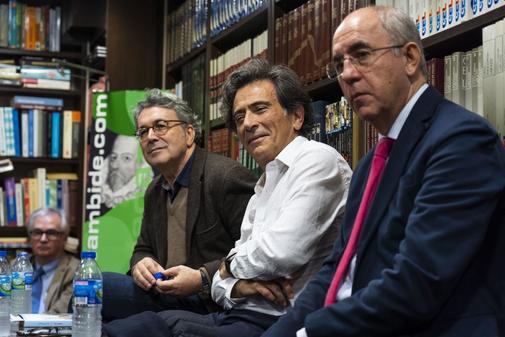The television broadcast of the procès trial converted, with the invaluable help of social networks, one of the most important moments of Spanish democracy into a media circus. At the minute, every gesture of a defendant was commented, every word of Judge Marchena; adventurous forecasts and analysis of tweet urgency were launched ... Amid the noise of immediacy, the chronicles that Arcadi Espada published daily on the pages of THE WORLD stopped time, providing calm and emotional distance to interpret a scenario with multiple masked actors .
For four months, the Espadian pieces were a practical vindication of good old journalism, that some take for granted prematurely. Grouped now in Sed de Lex (Funambulista), a flirtatious volume of 301 pages illustrated by Leonard Giovannini that on Tuesday the author presented in Madrid, accompanied by the director of El Mundo Francisco Rosell and the writer Andrés Trapiello.
"This is a distant book with the coup plotters and that also attempts to portray a moral landscape of Catalonia," summarized the Sword, surprised that many of the works that are being published these days about the trial are proudly declared equidistant with leaders who they prepared and perpetrated a "assault on Spanish democracy" publicly and without dissimulation.
He recalled in this regard his reference for the writing of these pieces from the Supreme, "Technique of a coup d'etat." The chronicle of Martín Prieto of Tejero's failed attack on democracy, and the fact that when it was published in 1982, it occurred to no one to despise him for taking sides against those who violated the legality.
In their presentations, both Roselll and Trapiello stressed that the 54 chronicles that make up the book of Sword have the will to transcend and be over the years the story of a very delicate time for Spanish democracy, with Pedro Sánchez about to form a government with the approval of Oriol Junqueras.
"These chronicles have grown and will continue to grow over time," Rosell said. The director of El Mundo said to see in Espada an update of the character of "Persian Letters" of Montesquieu since, for his "capacity for analysis", he points out "many things that his fellow citizens do not see, that attract our attention, scare us, but unfortunately they are true. "
"This book is like a fiction novel, but much more frightening because it has had real effects and is not a reverie," said Trapiello, a writer with whom Espada shares in Free and Equal struggles against galloping nationalism.
Judge Marchena's sentence, with its definition of the process as a collective "reverie" that never had a chance of becoming a reality, is another of the nuclear elements of the book, and it was this Tuesday of its presentation. "Marchena was wrong with a sentence that was not up to the trial, what was seen, or the capacity of the magistrates," said Espada, who thanked the collaboration of judicial chronicler Manuel Marraco in those marathon days.
"I would have preferred a lower penalty for the independence leaders as long as that ruling made it clear what they did publicly and transparently," admitted a Sword that did not hide his distaste for it. An appreciation in which Trapiello and Rosell agreed.
Among the attendees, the prosecutor of the Javier Zaragoza trial, the lawyer Carmen Ladrón de Guevara, the businessman Ginés Górriz (key man in the birth of citizens), the PP deputy Pilar Marcos, the translator Verónica Puertollano, the journalists Rafa Latorre, Rosa Belmonte, Leyre Iglesias, Emilia Landaluce, Luca Constantini, Jorge Bustos and Laura Fábregas, in addition to many readers of the blog and the columns of Espada.
According to the criteria of The Trust Project
Know more- Madrid
- Pedro Sanchez
- PP
- Oriol Junqueras
- Free and Equal
- Citizens
- Catalonia
- Catalonia independence
- SedDeLex
- 1-O trial
- Manuel Marchena
Politics Inés Arrimadas tries to recover the critics and place Citizens in the "useful" center
JusticeThe Prosecutor's Office criticizes the Supreme Court "opting" for a "down" sentence in the case of 1-O
CourtsThe disqualification of Quim Torra would lead to electoral progress in Catalonia

